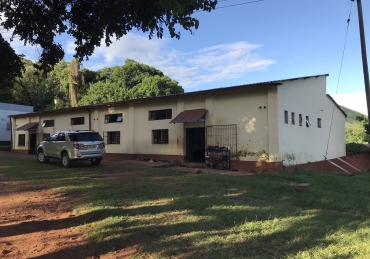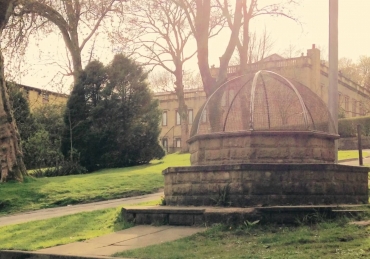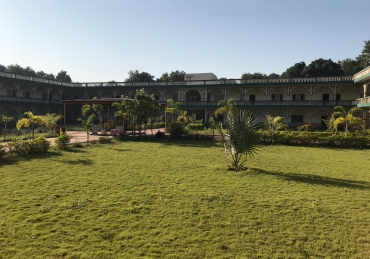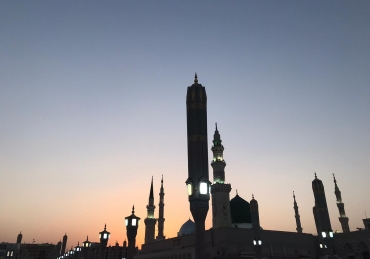Demise of Shaykh Muhammad Taha Karaan: a great loss for the Ummah
بسم الله الرحمن الرحیم
After performing Fajr Ṣalāh at 1.30am this morning, I was extremely saddened to receive the news of the demise of the learned scholar of Cape Town, South Africa and the Mufti of Muslim Judicial Council, Shaykh Muhammad Taha Karaan Raḥimahullāh who had been suffering from Covid-19 since the past few days.
Within hours of his demise, condolences, memories and messages started pouring in from across the world from scholars and individuals of different persuasions and backgrounds, reflecting on his encyclopaedic knowledge, profound insight, photographic memory, contribution, defence of the Islamic creed and Ahl al-Sunnah, oratory, poetic and literary skills and above all his character and humility. This reminded me of the ḥadīth of our beloved Prophet ﷺ who said:
“When Allah loves a servant, He calls out to Jibrīl and says: I love so-and-so, so love him. Then Jibril loves him. After that, Jibrīl announces to the inhabitants of heavens that Allah loves so-and-so, so love him, and the inhabitants of the heavens also love him, then acceptance is placed for him on earth (Ṣaḥīḥ al-Bukhārī, 3209).
In 2017, Shaykh Taha was invited to the UK by my dear friend, the Shafiʿī scholar, Mawlānā Irshaad Riyazuddin, the founder of Bayt Muhammad Academy, Blackburn, to deliver the keynote speech for the Academy’s first graduation programme featuring the completion of the Alim course by four students. I was also honoured to have taught Ṣaḥīḥ Muslim and the second part of Ṣaḥīḥ al-Bukhārī at the Academy during that 2016-17 academic year. I had previously read some of Shaykh Taha’s writings, however, this was my first meeting with him. An extremely humble and simple person with no takalluf (pretentiousness) whatsoever. When I presented to him some of my writings including the book on congregational Tahajjud Ṣalāh, he read the foreword and queried how such issues are received in the UK compared to South Africa. I mentioned that generally in the UK, scholars are respectful and accommodating and the atmosphere is more cordial similar to India, and on this particular issue, our Darul Uloom Bury and its senior teachers are sympathetic to the practice of Shaykh al-Islam Mawlānā Ḥusayn Aḥmad Madanī (d. 1377/1957). An interesting discussion followed.
During the conversation, Shaykh Taha said, “Fiqh of minorities (Fiqh al-Aqalliyyāt) should focus on closing certain doors instead of opening more doors.” I also recall him expressing surprise that that the scholars of the subcontinent have not rebutted some of the criticisms of ʿAllāmah Zāhid Kawtharī (d. 1371/1952) on Shāh Walīyullāh Muḥaddith Dehlawī (d. 1176/1762). It was clear that he was really fond of Shāh Ṣāḥib and critical of some of ʿAllāmah Kawtharī’s positions. Our respected teacher, Shaykh al-Ḥadīth Mawlānā Muḥammad Yūnus Jownpūrī (d. 1438/2017) was also critical of some of ʿAllāmah Kawtharī’s positions, notwithstanding his knowledge.
The Bayt Muhammad Academy graduation programme took place on Sunday 21st May 2017 at Masjid Saliheen, Didsbury Street, Blackburn and was attended by a large group of males and females. Shaykh Taha commenced by reading the entire Isnād (chain of transmission) from himself to Imam Muslim (d. 261/875) and thereafter from him to Imam Bukhārī (d. 256/870) both from memory, without making any errors. This was followed by an eloquent and elaborate speech covering a variety of themes.
Shaykh Taha filled an important void for our local Shāfiʿī community that sometimes suffers from inferiority complex due to the prevalence of Ḥanafī institutes. As a Shāfiʿī himself who graduated from Darul Uloom Deoband in 1991 and attained first position among hundreds of students, Shaykh Taha beautifully articulated the contribution of Imam Shāfiʿī (d. 204/820) and other Shāfiʿī scholars throughout the centuries to the ḥadīth sciences, reminding the audience of Shaykh Abu Ṭāhir Muḥammad ibn Ibrāhīm al-Kurdī (d. 1163/1750), the Shāfiʿī teacher of Shāh Walīyullāh Muḥaddith Dehlawī, and his influence upon him, along with the connection of Darul Uloom Deoband and other seminaries in the Indian subcontinent with Shāh Ṣāḥib.
During the commentary of the final ḥadīth of Ṣaḥīḥ al-Bukhārī, Shaykh Taha explained the fitnah of the Muʿtazilites in relation to the Ṣifāt (attributes) of Allah Almighty and other issues, and highlighted that the underlying cause of giving preference to ʿAql (intellect) over Naql (revelation) has resulted in various fitnas over the centuries including the modern-day challenges from liberals, secularists, and ḥadīth rejectionists. He thus connected the challenges of today with the challenges faced by the scholars of the past. This was unique about Shaykh Taha, he was a champion of preserving the tradition whilst possessing a unique ability to address the current challenges. As he himself said:
“The study of Islam is not simply an area of academic investigation. It is the continuation of a legacy—a legacy that was initiated with the revelation of Iqra’, whose foundations were laid over the 23 years of Prophethood, and whose edifice was raised by successive generations of keenly devoted scholars for well over a thousand years. The type of individualism that places the investigator in the centre and ignores the legacy of the discipline is foreign to Islam. Knowledge is handed down through a legacy of scholarship. The student, as the recipient of knowledge, becomes heir to that legacy. By inheriting the legacy, he becomes part of it, and it is then through him that the legacy is perpetuated. The legacy itself transcends time. But every subsequent age brings with it unprecedented challenges. It is only when the challenges of an age have been met that the claim of preserving a tradition becomes tenable. The dynamism inherent within the legacy of knowledge in Islam makes it possible for it to meet all challenges. Every instance of interaction between challenges and the legacy adds to the wealth of the legacy itself. Thus does the legacy progress and develop. And in this way do preservation and progress go hand in hand.”
During Shaykh Taha’s stay in Blackburn, I invited him, Mawlānā Irshad, the new graduates and some colleagues to my house for dinner. My respected father, Mufti Shabbir Ahmad (b. 1376/1957) was also present. Many issues were discussed. One discussion I recall is in relation to the teaching of Ṣaḥīḥ al-Bukhārī in the final year. Shaykh Taha mentioned that in their seminary, they focus on a few sections of the Ṣaḥīḥ rather than covering it in its entirety. My respected father suggested to him that the full Ṣaḥīḥ should be taught and outlined its benefits, adding that an expert can teach the full Ṣaḥīḥ in a year with detailed commentary throughout.
Separately, during one of my meetings with Shaykh Taha, I recall discussing the issue of Ḥānafīs performing Witr Ṣalāh behind Shāfiʿīs and informed him that many Ḥanafīs perform Tarāwīḥ Ṣalāh in the three Masjids in Blackburn run by the Shāfiʿīs and how some ḥanafīs withdraw thereafter and perform their own Witr Ṣalāh in congregation at the rear of the Masjid. Some of the Shāfiʿīs had previously complained to me in this regard. Whilst discussing this, Shaykh Taha mentioned something interesting about his father, who was a prominent Shāfiʿī scholar, leading Witr Ṣalāh at Darul Uloom Deoband. The following is a note from a Fatwa where I penned this, “In Shaʿbān 1438, the Shāfiʿī scholar Mawlānā Ṭāhā Karaan of South Africa informed me during his visit to the UK that his father Mawlānā Yūsuf Karaan (d. 1436/2015) once visited Darul Uloom Deoband in the month of Ramaḍān where he led Witr Ṣalāh in accordance with the Shāfiʿī method with a Salām after the second Rakʿah and also recited the Qunūt supplication after Rukūʿ. Some students objected to this after the Ṣalāh had completed. Mawlānā Fakhr al-Ḥasan (d. 1393/1973), the famous teacher of Sunan Abū Dāwūd, commented: “Bewuqūf, yeh bhee sunnat hey” (Fool! This is also Sunnah). The Ṣalāh was not repeated.” (Source: Witr Ṣalāh in Makkah and Madīnah). It is worth noting that Mawlānā Fakhr al-Ḥasan is different to Mawlānā Fakhr al-Dīn Murādābādī (d. 1392/1972) the famous teacher of Ṣaḥīh al-Bukhārī in Darul Uloom Deoband whose Īḍāḥ al-Bukhārī in Urdu is published.
After a tour of various different cities of the UK, Shaykh Taha returned to South Africa. As far as I am aware, this was the only time Shaykh visited the UK.
Thereafter, in April 2020, when we had started the reading of Musnad Aḥmad with my respected father, one of Shaykh Taha’s students from South Africa, Mawlānā Muhammad Ashraf informed me that Shaykh Taha had also started its recitation a few weeks ago and a third had been read. Thereafter, on 21 May 2020, Mawlānā Muhammad Ashraf shared with me two comments made by Shaykh Taha in relation to the obituary on Shaykh al-Ḥadīth Mufti Saʿīd Aḥmad Pālanpūrī (d. 1441/2020): (من خير ما رأيت) and (وهكذا فلتُكتب التراجم). During Shaykh Taha’s visit to the UK, Mufti Saʿīd Aḥmad Ṣāḥib was in the UK and Shaykh Taha came to visit his teacher at Darul Uloom Blackburn. I remembered this and included Shaykh Taha’s name among Mufti Ṣāḥib’s students in the obituary. The following day on 22 May 2020, Mawlānā Muḥammad Ashraf forwarded me some messages between him and Shaykh Taha:
هل أنت على اتصال بالمفتي يوسف شبير؟
نعم
بلغه مني الشكر والتقدير لذكره إياي في التلاميذ، مع التحيات مني، والسؤال عن مقرأ المسند لديهم
This was his humility. I replied with the following via Mawlānā Muḥammad Ashraf, “Walaikum Salam. Please also convey my Salams and request for Duas. In Ramadan we have been doing 90 minutes daily of Musnad. Al-Hamdulillah, nearly finishing Musnad of Abdullah ibn Umar Radiyallahu Anhuma. Duas requested. Wassalamu alaykum.”
The following day on 23 May 2020, Mawlānā Muḥammad Ashraf shared with me Shaykh Taha’s Arabic eulogy poem on Mufti Saʿīd Aḥmad Ṣāḥib which, like his other writings, was testament to his mastery and command of the Arabic language and his respect, admiration and appreciation of his teacher. It is my sincere hope that the various writings and poems of Shaykh Taha in Arabic, Urdu and English are collated and published for wider benefit. May Allah Almighty make this possible.
Mawlānā Muḥammad Ashraf informed me today that from among his teachers, Shaykh Taha had a very close attachment to three teachers: (1) His father Shaykh Yusuf. (2) Ḥāfiẓ Abdurrahman Mia with whom Shaykh completed the Hifz of the Quran at the Waterval Institute in Johannesburg. (3) Mufti Saʿīd Aḥmad Pālanpūrī. Mawlānā Muḥammad Ashraf also shared with me a statement of Mufti Saʿīd Ṣāḥib in South Africa, the translation of which is as follows:
“One of my friends is sat with us in this gathering, Mawlānā Taha. His father Mawlānā Yusuf was my colleague in Darul Uloom Deoband. Then he [Mawlānā Taha] also came to Darul Uloom and attained first position in the Dawrat al-Ḥadīth class, and although I love all my students, my love for him is more, and he also loves me.” (Mufti Saʿīd Aḥmad Pālanpūrī)
It was then on 8 December 2020 that Mawlānā Muḥammad Ashraf shared with me a poem of Shaykh Taha in defence of our respected Mufti Muhammad Taqi Usmani (b. 1362/1943) and in response to some vile comments made by a particular individual. I replied to Mawlānā Muhammad Ashraf, “Jazakallah. Best to ignore him” and I shared with him a couplet attributed to Imam Shāfiʿī which begins with (قل بما شئت في مسبة عرضي).
Interestingly, Mawlānā Muḥammad Ashraf shared with me an audio clip of Shaykh Taha’s Musnad Aḥmad lesson today wherein he mentions after a particular ḥadīth that until today I had forgiven everyone except a ‘particular individual’, and today I make you witness that I have also forgiven that individual. He said:
أمَّا اليوم فإني أشهدكم على أني عفوت عن فلان، ولا يبقى بيني وبينه أي شيء في يوم القيامة، عفوت عنه رجاء أن يغفر الله لنا، كما ورد في قوله تعالى: ولا يأتل أولو الفضل منكم والسعة أن يؤتوا أولي القربى والمساكين والمهاجرين في سبيل الله، وليعفوا وليصفحوا، ألا تحبون أن يغفر الله لكم. نسأل الله أن يجعلنا ممن يتحلى بحلية السنة، ممن يتخلق بأخلاق محمد صلى الله عليه وسلم، وممن يتبع ويخضع لقوله صلى الله عليه وسلم، ولأمر الله تبارك وتعالى
Shaykh Taha’s position in relation to adopting reasonable precautionary measures during Covid-19 is well known, a position shared by most scholars across the world. Towards the end of December, he published a collection of 40 Ḥadīths with commentary on contagion and pandemics entitled, ‘Fleeing from Fate to Fate – 40 Aḥādīth on Contagion and Pandemics’. The final ḥadīth and the final page of the collection is worth quoting here considering he passed away in this very pandemic on the blessed night of Friday:
Undoubtedly, Shaykh Taha’s demise is a great loss for the Ummah. A giant and an ocean of knowledge has departed the world, reminding us of the statement “the death of a scholar is the death of the world.” May Allah Almighty illuminate his grave, accept his life-long service, forgive his shortcomings and grant him an abode in Jannat al-Firdaws.
Shaykh leaves behind his mother, four sons and four daughters. His brother Professor Mohammad Karaan passed away in January 2021 and his sister passed away a few years ago. May Allah Almighty grant Ṣabr Jamīl to his mother and the children, along with the thousands of students and admirers worldwide.
Yusuf Shabbir
30 Shawwāl 1442/11 June 2021
Note: Shaykh and his students began the reading of Musnad Aḥmad on Friday 2 Shaʿbān 1441 (7 March 2020) and the final reading was on 28 Ramaḍān 1441 (22 May 2020), this was the 86th reading. Shaykh had reached Ḥadīth number 19825 in the Risālah edition, and it was Shaykh’s desire to complete the reading by re-convening on a weekly basis. My respected father Mufti Shabbir Aḥmad began the reading of Musnad on Wednesday 15 April 2020 and completed it in its entirety on Sunday 2 May 2021.








